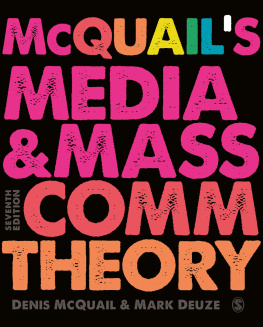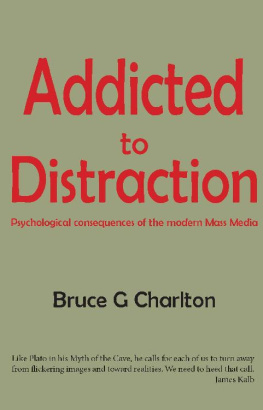DISCONNECTED AMERICA
MEDIA, COMMUNICATION, AND CULTURE IN AMERICA
Michael C. Keith and Donald A. Fishman, Series Editors
WAVES OF RANCOR
Tuning in the Radical Right
Robert L. Hilliard and Michael C. Keith
SCREENED OUT
How the Media Control Us and What We Can Do About It
Carla Brooks Johnston
DISCONNECTED AMERICA
The Consequences of Mass Media in a Narcissistic World
Ed Shane
INVISIBLE STARS
A Social History of Women in American Broadcasting
Donna L. Halper
(forthcoming)
QUEER AIRWAVES
The Story of Gay and Lesbian Broadcasting
Phylis Johnson
(forthcoming)
DISCONNECTED AMERICA
The Consequences of Mass Media in a Narcissistic World
ED SHANE
First published 2001 by M.E. Sharpe
Published 2015 by Routledge
2 Park Square, Milton Park, Abingdon, Oxon OX14 4RN
711 Third Avenue, New York, NY 10017, USA
Routledge is an imprint of the Taylor & Francis Group, an informa business
Copyright 2001 Taylor & Francis. All rights reserved.
No part of this book may be reprinted or reproduced or utilised in any form or by any electronic, mechanical, or other means, now known or hereafter invented, including photocopying and recording, or in any information storage or retrieval system, without permission in writing from the publishers.
Notices
No responsibility is assumed by the publisher for any injury and/or damage to persons or property as a matter of products liability, negligence or otherwise, or from any use of operation of any methods, products, instructions or ideas contained in the material herein.
Practitioners and researchers must always rely on their own experience and knowledge in evaluating and using any information, methods, compounds, or experiments described herein. In using such information or methods they should be mindful of their own safety and the safety of others, including parties for whom they have a professional responsibility.
Product or corporate names may be trademarks or registered trademarks, and are used only for identification and explanation without intent to infringe.
Shane, Ed.
Disconnected America: the consequences of mass media in a narcissistic world / Ed Shane.
p. cm. (Media, communication, and culture in America)
Includes bibliographical references and index.
ISBN 0765605260 (hardcover : alk. paper) ISBN 0765605279 (pbk. : alk. paper)
1. Mass mediaUnited States. I. Title. II. Series.
P92.U5 S48 2001
302.230973dc21
00059503
ISBN 13: 9780765605276 (pbk)
ISBN 13: 9780765605269 (hbk)
To Pamela
Thanks for a terrific connection
Table of Contents
Foreword
One of the recurrent topics of contemporary life in America is the fraying of community standards, the erosion of face-to-face interaction, and the detachment of individuals from participation in civic affairs. The villain in this societal drama is a multifaceted monster: Two-career families, suburbanization and residential sprawl, greater job insecurity, the breakdown of religious authority, increased time pressures, failing school systems, and the harmful effects of television.
Ed Shanes book synthesizes the most salient problems, or disconnections, that individuals experience as a result of the rapidly evolving changes in the technologies of communication. Moreover, Shane places these disconnections into a broader framework: That the development of the information society has not only brought a new dawn of instantaneous communication, but it has been accompanied by a darkening shadow as individuals find themselves in a world of voyeuristic television programs, attention-getting stunts, trivialized information, and glorified crisis events. Shane contends that there is an inherent but unfortunate bias within the media against offering complex interpretations that provide history and meaning to the reporting of news events.
Many of the topics that Shane examines have been discussed elsewhere. Shane draws upon the theories of Robert Putnam, Christopher Lasch, and Daniel Boorstin to create an interpretive structure for his observations. But Shane has the ability to synthesize abstract trends, summarize lengthy research articles, and place them into a context that provides meaning to everyday events. His conclusion that we are moving closer to the narcotic-like trance depicted by Adolph Huxley in Brave New World than grim prison-like atmosphere created by George Orwell in Nineteen Eighty-Four is an astute interpretation of the growing dependence by the public upon communication technologies for work, entertainment, and even conducting and maintaining caring relationships.
There are three major virtues to this book. First, it is written clearly. Shane has a good eye for language, and the organization of materials is compelling. Second, Shane has the ability to identify major trends that will impact society. For instance, Shane writes: The internet allows the general public to tap into sources once used only by journalists and government officials. Thats democracy at its best when there are no mistakes. Yet misinformation and disinformation are aided and abetted by unsuspecting web surfers who pass along stories that interest them to long lists of e-mail correspondents. There is a multiplier effect to these e-mail messages as recipients further send them to friends and family members. Thus, what starts off as an advantage for societydirect access to informationends up as a liability because of the absence of responsible gatekeepers to help the public sort out the information and distinguish the trivial from the important. Unfortunately, the new dawn of information is accompanied by a lengthy darkening shadow.
The third virtue of this book is more intangible than the other two. Shanes thesisthat the evolving information society produces as many drawbacks as alleged benefitsis developed gradually and persuasively in each chapter. By the end of the book, the whole is larger than the sum of its parts. Yet each of the parts contains astute observations, and Shanes examples are riveting. The mixture of information, entertainment, and digital reality has created a new worldbut not necessarily a brave one; unsettling would be a more appropriate term.
This book is likely to be widely read. Information has become the economic capital of the twenty-first century, and there are a growing number of books that describe digital property, the information economy, and the culture of the internet. But Shanes book provides a coherent and compelling interpretation, bringing together ideas and concepts being explored in many disciplines but that previously have remained disconnected. This is work that provides insight and analysis into Americas increasing immersion into instantaneous communication.
Donald A. Fishman
Boston College
Reading this book before sending it to the publisher made me appreciate Walter Cronkites address to the Radio Television News Directors Association meeting in Miami Beach in 1976. Cronkite had been misquoted by the press and by his own medium, and he sought to set the record straight in front of his newsroom colleagues. He began, If we this morning were operating under the same strictures which bind you and me in doing our daily jobs, I now would have finished my speecheleven seconds after starting it.










